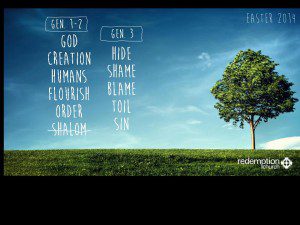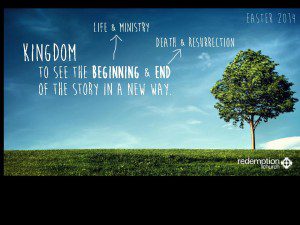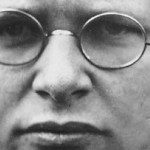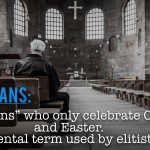https://www.youtube.com/watch?v=sbVz8IKhc9U
On Easter Sunday we showed this clip just before the sermon. When the song started, you could hear little voices all over the room start to sing along. The sound took my breath away. It was our kids. On Christmas & Easter we have all of our children, even the babies, join us in worship; that way no one misses out. They knew the song & couldn’t help themselves. After a couple lines the singing died away (I think the parents started shushing them). If I had it to do all over again, I’d invite them to sing along.
This sermon was delivered on Easter Sunday, 2014 at Redemption Church in Olathe, KS. I have to acknowledge Rob Bell’s “Begin at the Beginning,” talk, from which I took the central thesis & some of his good language. I stole the “Up there down here” language from John Ortberg. If you are a pastor, feel free to copy and steal anything here.
_________________________________________________________________
2014.04.20 – Easter 01
John 20 – Frozen and the Resurrection
How many of you have seen this movie, Frozen? How many of you LOVE, this movie Frozen. Did you hear all the little voices singing when the song started? That was amazing. I think the movie is interesting in part because all of the tension in the story revolves around the relationship between these 2 sisters.
Elsa (older sister) has this power: she can create ice and snow; which is amazing, but it can be a bit dangerous sometimes. Once when she was a little girl she seriously injured her little sister Anna while they were playing together. But, it’s Disney right? So magic trolls fix the little sister right up, and the parents decide to isolate Elsa from her little sister until she can learn how to control her gift. And to make it easier, the trolls remove part of Anna’s memories. After than, Anna remembers how much fun they had together & how close they were. But she doesn’t remember anything about her sister’s magical ability. Elsa, remembers everything. She knows that she has this amazing little sister that she loves, how much fun they used to have. But she’s terribly afraid she’ll hurt her little sister. So she cuts herself off completely.
Anna (the younger sister), starts the story a few chapters in. She remembers playing w/her big sister, but has no memory of the reason there’s a problem. She’s hurt by this sister she loves, and doesn’t understand why Elsa won’t play with her, or talk to her, and never comes out of her room.
Elsa tells the story from the beginning, w/this gift that seems wonderful, but it’s dangerous & she can’t control it. Anna begins the story in the middle, w/a sister who used to be fun, but now she’s completely withdrawn. Since they begin in such different places, they both tell very different stories about their lives… so they end up on opposite sides of a door, both wishing they could be together: the older thinking it’s an act of love, the younger one thinking it’s an act of rejection. The only difference where they begin to tell the story…
I once heard a pastor say, “Where and how you begin the story, and where and how you end the story, shapes and determines what story you’re telling…” Parents know this routine: one child runs upstairs crying, “Brother slapped me in the arm.” You yell for brother, who appears in tears carrying the Lego ship he spent 4 hrs building, now in 100 pieces. Anyone familiar with this? Where you begin the story determines what kind of story you’re telling.
So when it comes to the big, big story; the cosmic story of the world & where it came from and our lives, and what they mean… Where and how you begin, and where and how you end that story will determine what kind of story your life is telling.
In the movie Frozen, the Anna tells a story about an older sister who’s cold–an ice queen–it felt like her sister didn’t love her anymore. But she wasn’t beginning from the beginning of the story. The older sister tells a very different story. She thinks she is acting out of love. What’s strange is that it’s the same reality. They are living the same reality. But they begin the story in very different places. And where and how you begin the story will determine what kind of story you’re telling.
Now, Endings have a similar impact on the story as well. In the Frozen story (btw, let me just give a spoiler alert: If you’ve never seen Frozen before, I’m totally going to ruin this movie for you. But it’s already grossed over $650 million – so if you never see it, I think Disney will still be okay), as the story builds… you begin to see that the older sister has become consumed w/the fear that she’ll end up hurting the people close to her. So she isolates herself; she runs off & builds this superman-style fortress of solitude… it’s this ice castle for a snow queen. She’s so afraid her life will end badly, that she cuts herself off. This has an impact not only on her younger sister, but the whole land, which is now in this perpetual winter.
Anna has a very different ending in mind, especially after their parents die. She believes that the story can have a happy ending (together). So she refuses to give up on it; she trudges off through the snow to find her sister. They both have these different ideas of how the story will end. Elsa thinks it’s a tragic story of isolation & loneliness & fear. Anna thinks it is a love story. And how you END the story will determine what kind of story you are telling…
You guys remember the movie Charlie Wilson’s War? In it, Phillip Seymour Hoffman’s character tells this story:
“There’s a little boy and on his 14th birthday he gets a horse, and everybody in the village says, “How wonderful. The boy got a horse.” And the Zen master says, “We’ll see.” Two years later, the boy falls off the horse, breaks his leg, and everyone in the village says, “How terrible.” And the Zen master says, “We’ll see.” Then, a war breaks out and all the young men have to go off and fight… except the boy can’t cause his legs all messed up. And everybody in the village says, “How wonderful.” And the Zen master says…
What does he say? We’ll see… The point is that where and how you end that story will determine what kind of story it is you are actually telling.
I’m sure you’ve made the connection already, but it bears making it explicit: this is how the Christian story works as well. Where and how you begin the story of God, and where and how you end the story of God, will shape and determine what kind of story you’re telling. Today we tell the story of how the end of the story takes am unexpected twist in the life of Jesus Christ.
In the scripture we just read, Mary looks straight at Jesus and doesn’t recognize him. She is convinced she already knows the end of that story. Mary has no imagination for how there could be a different ending of the story. Dead people don’t get up and walk around. And Messiah’s don’t die. One theologian has said that saying “crucified Messiah” was like saying “boiled ice.” That’s what Easter is all about: giving us a new imagination for how the story can end, in the hopes that this can change everything about the story we tell with our own lives right here and now.
This story BEGINS clear back in Gen. 1, with a God who is distinct from creation, which was a strange thing to believe in a culture where pretty much everyone worshipped the creation or some part of it. But the Hebrew God is distinct from creation. And this God creates things, that can create more things: trees that can make more trees; animals that can make more animals. And one creature God has a special relationship with (humans). God gives them responsibility over the creation. Their job is to take care of it, and steward it. “Be fruitful & multiply; fill the earth & subdue it, have dominion over it. Till the earth & keep it. Make it grow & flourish.”
Everywhere God looks; God wants to see things flourishing. And this diverse creation exists in a kind of order. God is distinct from creation, but intimately involved. Creation is dynamic, it’s growing & constantly developing. Humans are meant to order creation in certain ways: Sabbath rest, honoring fathers and mothers, not killing, lying… The order is meant to allow everything to flourish. Creation is “teeming” with life because it is rightly ordered.
But if the people try to be God, it won’t work. And if the people start to worship creation it won’t work. There’s an order – a harmony to it all.
The Jewish people had a word for this order/harmony: shalom (peace) – which is not like inner peace, or world peace. It means everything in its proper place functioning as it should, that’s shalom. And God blesses all of this and calls it good. This is how the story of God & us begins in Genesis 1 and 2.
Then comes Chapter 3 of Genesis, where shalom is disrupted, and harmony is replaced with an ugly dissonance. And all of the human’s relationships go sideways, and the people begin to: hide from God; they feel shame about their nakedness; they blame each other; and when they work the earth works against them, and the work becomes toil. The order that everything needs in order to flourish is disrupted. For us, this disrupts the way we relate to God, ourselves, other people, and the created order.
The order, and harmony, and shalom is disrupted. The Hebrew people have a name for this as well, they call this disruption sin. To the Hebrew mind, sin isn’t just cheating on your taxes, or lying to your parents. Sin is just anything that disrupts shalom & ruins the harmony of creation. That’s what happens in Gen. 3.
Now some people have a tendency to start the story of God from Gen. 3 (with sin), instead of Gen. 1-2 (with creation, order, flourishing, & shalom). And, if you begin the story in Gen. 3, then the story you tell when you talk about God becomes about the removal of sin. But, if you begin the story in Gen. 1, then the story you tell is about the restoration of shalom… which includes dealing with sin, it’s just so much bigger than that.
If you begin in Gen. 3, you end up telling a story that’s based in what’s wrong with everything (hiding, shame, blame, toil, sin). If you begin in Gen. 1, you end up telling a story that’s based in what we are meant to be: (God, creation, humans, flourishing, order, shalom)… and those are very different stories. Just like the two sisters in Frozen: one story produces fear, the other produces hope. One is about managing sin. The other is about God’s determination to redeem & restore everything: creation, humans – all flourishing in order & shalom.
So where and how you BEGIN the story of God, will shape and determine what kind of story you’re telling; who you think GOD is & who YOU are & what your life means… How you begin impacts all of it.
Now, where & how you END the story has a big impact too. This part’s tricky. I mean how do you know the end of the story before it happens? You can guess, but you’ll probably guess wrong. Often those who start in Ch. 3, they end up saying the story is about God punishing all the sinners. Sometimes they say God is about beaming up the good people & frying the bad ones who are left behind.
But Jesus chose to talk about the big story in a different way; in fact, over & over in all the gospels he used the same metaphor of kingdom. For us this is odd, because don’t have kings in our society. We’ve got, like… Burger King. It’s not really the same is it? We have some kings. Who’s the king of Rock & Roll? (Elvis). The king of pop? (Michael Jackson). This is for the children of the 80s: Who’s the sausage king of Chicago? (Abe Frohman – Ferris Buehler)
We have some kings, but it’s not the same thing. So we don’t always get this concept of kingdom. A kingdom is a place where whatever the king wants to happen, happens… where the king gets to say. So, a king’s kingdom is the range of the king’s effective will. (Dallas Willard). Where the king’s will is done, that’s his kingdom. Where the king’s will isn’t done, is not his kingdom.
So, when Jesus talked about the big story, the cosmic story, he said that God’s kingdom was breaking into earth. So this is his prayer: “Thy kingdom come, thy will be done on earth as it is in heaven.” This is his most common sermon: “The KOG is at hand/near” JS believed that the place where God gets to reign & rule (his kingdom) it has appeared, and was unleashed & taking over.
God’s will is for things on earth to be ordered just like the beginning of the story: with order, harmony, flourishing, shalom. And when God is the king, that’s how the world will be; that’s God’s will. So, Jesus wasn’t trying to get everyone down here to go up there. He was trying to get up there to come down here. (Thank you John Ortberg). He wanted God to reign on earth; for God’s kingdom to come. He wanted the range of God’s effective will to extend to all of us.
That’s why everywhere Jesus went he was healing people. Anytime Jesus saw a disruption of shalom he moved against it, to restore right order, to restore peace & harmony & flourishing. Jesus’s mission was to usher in a new kingdom, with God reigning & ruling once again & all things rightly ordered. The way he went about it was that he tried to get his followers to see the beginning & end of the story in a new way… hoping that with a new beginning & ending, they could start to live a different story with their lives right now.
______________________________________________________________
Jesus’s mission was to usher in a new kingdom, with God reigning & ruling once again & all things rightly ordered. The way he went about it was that he tried to get his followers to see the beginning & end of the story in a new way… hoping that with a new beginning & ending, they could start to live a different story with their lives right now.
______________________________________________________________
If he could change the way they see the BEGINNING: they’d see God isn’t about crushing the broken; but forgiving the broken & restoring shalom.
If he could change the way they see the END: they’d see death might be the enemy, but that God’s love can actually overcome death…
The way he changed the beginning was through his life & ministry. Thru his teaching, healing, actions, everything JS does show that God is a God of love & forgiveness, healing, restoration.
The way he changed the end is, he was faithful all the way to death: Believing that God wouldn’t abandon him… God would raise him up.
Jesus taught that if we can see the new Beginning/Ending: how we enter into that new story, is to live our lives the way that Jesus lived his life. To tell the same story with our lives that he told with his; to pour out our lives for the people around us; to die to ourselves in a thousand tiny ways every day; believing that after every death died for the sake of God’s peace (and God’s shalom, God’s kingdom on earth), comes a resurrection.
The movie Frozen is actually a resurrection story. You remember what happens at the end of the movie? Anna, she dies for her big sister… the ice Queen. There’s an assassin who’s about to kill her and Anna steps in front of him & gives her own life to save her sister… It’s the gospel… it’s Jesus saying, “Greater love has no one than this: to lay down one’s life for one’s friends.” (John 15:13-14).
The self-sacrificial love unleashes new life and that changes the two sisters’ story forever. If you think about it this is a radical departure for a Disney Movie. The whole Disney narrative is built on the power of true love’s kiss, right? (that’s Beauty & the Beast, Snow White, Sleeping Beauty). But in Frozen, they subvert their own narrative. It’s not romantic love, but self-sacrificial love that changes their story.
When Anna lays down her life for her sister, Elsa is broken-hearted. Then comes the resurrection scene & Elsa finally sees that love is stronger than fear (or sin, shame, blame, hatred, & anything on the list from Genesis 3). And their whole story changes. Self-sacrificial love become her entrance into a whole new story. And all of the sudden order is restored, ice melts, and the queen is able to steward her gifts in a good way.
That’s resurrection. When Jesus is resurrected, we see how the story is going to end; we know that what God did for Jesus, God will do for all of us one day. We learn that the end of the story is really a new beginning.
If that’s the end of the story, then we can live without fear. If that’s the end, then it changes everything that comes before it… because it means that life will overcome death in the end. And if that’s true, all the sudden we can pour out our lives for each other. We don’t have to worry that life might run out. There will always be more life for those who live like Jesus lived. So we are able to live differently, unselfishly – actually we live a life that is rightly ordered, like God designed from start (shalom).
______________________________________________________________
This is the great hope of resurrection: Those who are alive in Christ become so fully alive, that when they die, life overcomes death. This changes everything about the story you tell w/your own life.
______________________________________________________________
So the question I invite you all to ask on this Resurrection Sunday, is the question that Resurrection demands we ask: Is this the life I want to live? I got one shot at this; is my life rightly ordered? Is this peace/shalom or is this fear, greed, shame, loneliness… Resurrection gives us permission to change & just go for it. Is this the life you want to live?
The story of God says that you can be born into a whole new story anytime you’re ready. And your entrance into that new story is about catching a glimpse of this amazing beginning, and new ending; and knowing that if that’s the way the story ends, I can live w/out fear. If that’s the way the story ends, I can pour my life out for others, for the life of the world without worrying that my life will give out. If that’s the way the story ends, I can steward my gifts for kingdom.
How you begin and end the story will determine what kind of story you tell – with your life. Our story begins with a God who loves us and gives us a calling to order the world & cause it to flourish. Our story ends with a new beginning. So every time we die to ourselves and others, God uses that as the vehicle for new life. Believe in that, and it will change everything about the story you tell with your life right now.














